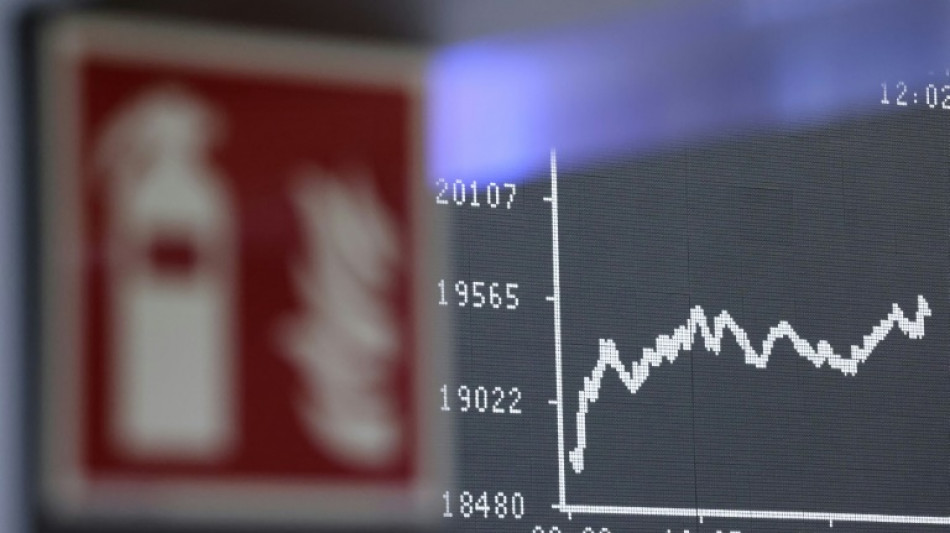
RBGPF
-0.1300

Embarrassed and in debt, Edwin was left reeling after losing $16,000 to CryptoBridge Exchange (CBEX), one of the crypto-trading platforms preying on investors in Africa.
Edwin, a Kenyan government worker who only gave his first name out of shame, first encountered CBEX on Telegram, a messaging app.
He was lured with promises of guaranteed monthly returns made possible by AI-powered trading systems, with lucrative referral bonuses -- classic hallmarks of Ponzi schemes.
"I had very big plans. But I was conned both by the platform and an agent who lied he could help recover my money," Edwin told AFP.
When he began investing last August, there were initial returns, leading him to invest more despite lacking prior cryptocurrency trading experience.
In total, he believes he lost roughly 2.1 million shillings ($16,000), mostly from a bank loan he is now worried about needing to repay.
Blockchain analysis firm Chainalysis says some $9.9 billion was lost to crypto scams globally last year.
Such scams are not new in Africa, but their scale and sophistication has grown as cryptocurrency spreads.
CBEX collapsed in April, leaving scores of investors like Edwin ruined, mainly in Kenya and Nigeria, according to media reports.
But AFP has confirmed from accessing messages on CBEX's private Telegram groups that it has since rebooted its operations despite ongoing investigations and warnings by authorities.
- 'I'm broke' -
Abby, another Kenyan investor, carries the guilt of introducing 25 family and friends to CBEX.
"(They) invested so much, and it all disappeared," he told AFP. "I would really love to help them recover but I'm broke."
In Nigeria, news of CBEX's collapse led to attacks on CBEX-affiliated offices, which have since closed.
Adeoye, a Nigerian victim, lost N700,000 (about $450).
"The offer was juicy," he said. "I knew it was a risk, but I thought I would be lucky to cash out before anything happened."
CBEX used the "brandjacking" tactic, adopting an acronym similar to the China Beijing Equity Exchange to give it legitimacy.
The platform claimed to be licensed in the US and said ST Technologies International was responsible for the AI trading signals, allowing it to operate in Nigeria under the corporate identity of ST Technologies International Ltd (Smart Treasure/Super Technology).
It even obtained an anti-money laundering certificate from Nigeria's Economic and Financial Crimes Commission (EFCC) this January, though the EFCC has clarified that this was only for "consultancy services", not for currency exchanges.
- 'Build trust' -
To add further legitimacy, CBEX claimed it was established a decade ago and the ST team eight years ago. In reality, it began operations in Nigeria last July, according to local media, before spreading to Kenya.
"If you check CBEX wallet addresses on-chain, they were only operating for about a year before the collapse," Kenyan cryptocurrency investigator Wycklife Sewe told AFP.
While pretending to actively trade, CBEX actually moved funds out of investors' wallets via TRON (a decentralised blockchain network), said Sewe.
The assets then underwent complex routing through multiple wallets and cryptocurrency conversions to obscure the audit trail.
"They have designed their system using code to fool you that your money is still there and you can see it growing. But your money is moved immediately after you deposit," Sewe said, adding that CBEX was also running other scams.
CBEX has changed its website domain several times to avoid attracting attention. AFP found at least four registered by it.
- International warnings -
In April 2024, the Hong Kong Securities and Futures Commission, an independent market regulator, issued a public alert against "CBEX Group".
A recent investigation by crypto analyst Specter linked CBEX's withdrawal wallets to darknet marketplace Huione Guarantee, a Cambodia-based platform known for providing illicit tools to facilitate crypto crime.
The US Treasury's Financial Crimes Enforcement Network (FinCEN) designated Huione Group a "primary money-laundering concern" in May, saying that it had facilitated more than $4 billion in illegal transactions between August 2021 and January 2025.
Following CBEX's collapse, Kenya's Capital Markets Authority issued an "Investor Alert" about unregulated platforms, and parliament is discussing a bill to regulate virtual assets.
- 'Never again' -
Nigeria's EFCC says it has arrested two people and put out warrants for eight others in Nigeria and Kenya. A new Investments and Securities Act expressly prohibits and criminalises Ponzi schemes.
But investigations are lengthy and expensive.
In May, the EFCC said a "reasonable sum" of lost funds had been recovered, without stating the amount, highlighting the complexity of converting cryptocurrencies back to national currency.
A Telegram spokesman told AFP that "scam content is removed when discovered and offending users banned". AFP found some CBEX Telegram groups were now labelled as scams on the platform.
On June 10, CBEX, which had previously blamed hackers for the missing funds, claimed on its Telegram channels to have "compensated" the lost money.
But it asked affected users to complete "verification" by paying a fee -- a common re-scamming tactic.
For victims like Abby, the way forward is easy.
"Never, ever again! I am done," he said.
A.Stransky--TPP